InTheBite Magazine Presents Captain of the Year Award
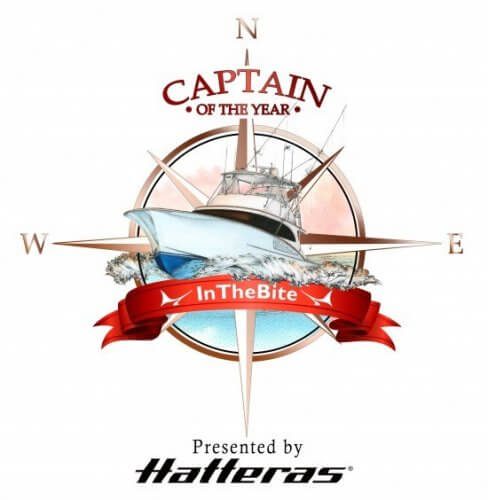
One of the last billfishing competitions of the summer, the Virginia Beach Billfish Tournament concluded this past weekend in Virginia Beach, VA. The tournament hosted 75 teams this year for three days of fishing. First place went to Capt. Fin Gaddy of the Qualifier, who landed an 801 lb. blue marlin. Also at the tournament was InTheBite magazine, who recognized an award winner. Elliott Stark, from InTheBite, presented Capt. Harvey Shiflet of Anticipation with the Captain of the Year Award, alongside mate Frank Riganto and boat owner Paul Coury. The Billfish Foundation will be sponsoring this honor at next
Winner of Florida West Coast Bluewater Series Tags Every Billfish
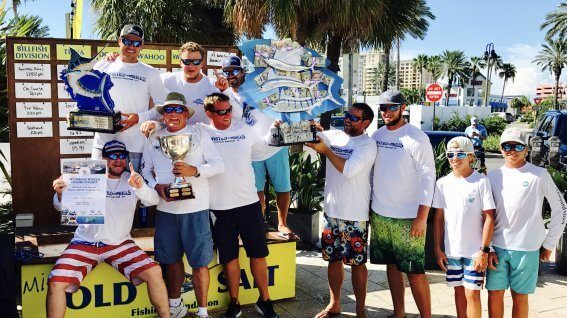
The 46th Annual Old Salt Loop Billfish Tournament concluded in Clearwater, Florida this past weekend, wrapping up the Florida West Coast Bluewater Series (FWCBS) as it was the third and final leg of the series. First Place Overall Series Winners for the FWCBS went to Twisted Bills, owner Ralph Munyan and crew: Captain RJ Schwab, Daniel Munyan, Robbie Munyan, Grant Johnston, Jason Lozeau, Hugh West and Hunter Gibson. The team was also awarded 1st Place Billfish Release Division and 1st Place Swordfish in the Loop Tournament. But the most impressive distinction of their victory was that every one of the
Rubio & Nelson Introduce Florida Fisheries Improvement Act

Earlier this month U.S. Senators Marco Rubio (R-FL) and Bill Nelson (D-FL) introduced legislation designed to enhance and protect Florida’s fishery resources and those who rely on them. The Florida Fisheries Improvement Act comes with a number of changes to improve flexibility for management as well as stakeholder input. “This bipartisan bill reflects the best ideas from Florida’s commercial, charter and recreational fishing communities, and would ensure federal fishing laws reflect the realities of our unique Gulf of Mexico and South Atlantic regions while continuing to promote research and conservation efforts,” Rubio stated in a press release. “As
Submit Comments on Allowing Longlines in Closed Zones to Florida Elected Officials!
Click here to submit comments to FL Senators Rubio and Nelson. Click here to submit comments to your US & FL House representatives and FL State Senators. Click here to submit comments to FL Governor Scott. The Office of Highly Migratory Species (HMS), a division of the National Marine Fisheries Service (NMFS), charged with conserving and responsibly managing highly migratory fish species reversed 16 years of conservation with their approval of an Exempted Fishing Permit (EFP) on August 10, 2017. The permit will allow pelagic longline boats back into the east coast closed zone to fish. Sixteen years ago
Hypocrisy – Florida’s $7.6 Billion Dollar Recreational Fishing Industry Slapped by Federal Agency
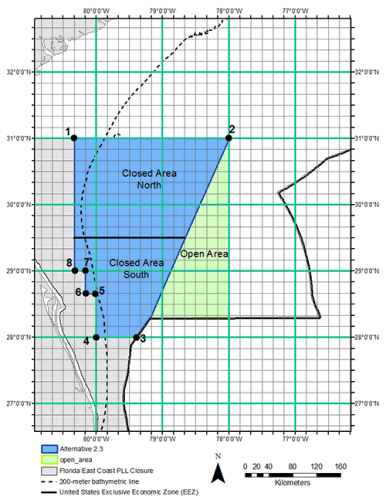
After the National Marine Fisheries Service (NMFS) announced today its approval of the Exempted Fishing Permit that allows longline boats to fish in Florida’s east coast closed zone, Ellen Peel, President of The Billfish Foundation (TBF) said, “Florida anglers, all anglers who fish off Florida’s east coast and the recreational fishing industry should be irate at the National Marine Fisheries Service (NMFS), Office of Highly Migratory Species for not valuing or respecting recreational fishing by their approval of the Exempted Fishing Permit, which allows longline boats to fish inside Florida’s East Coast Closed Zone. Florida has more anglers than any other
2017 Atlantic Billfish Landings Remain Far Below Allocation
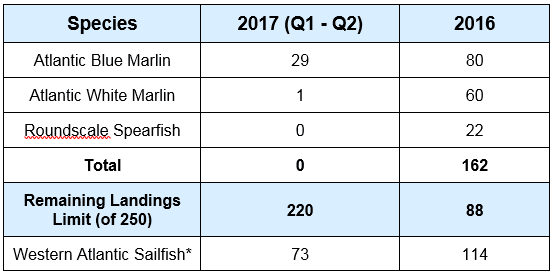
On Tuesday NOAA released preliminary numbers for Atlantic billfish landings in 2017. The estimates show individuals caught (and reported) thus far in 2017, from January 1st through June 30th, for blue and white marlin, roundscale spearfish, and western Atlantic sailfish. As can be seen in the table below, much of the year’s allocated landings remain available. The Billfish Foundation applauds anglers for supporting the philosophy of catch and release fishing. The landings are compiled from self-reporting from anglers, tournament landings from the Recreational Billfish Survey (RBS), catch card reports from North Carolina and Maryland, and individual billfish intercepted by the
Pacific Bluefin Tuna Will Not Be Listed As Endangered
The National Marine Fisheries Service announced Tuesday that they rejected a petition to list the Pacific bluefin tuna as an endangered species. A long list of environmental organizations combined efforts to submit a request in June 2016 for the species to be protected under the Endangered Species Act. These groups are vastly disappointed in the decision, and argue that bluefin tuna—a luxury sushi item in high demand globally—are in fact endangered as their populations are at just 3 percent of what the stock once was. Alternatively, The Billfish Foundation was glad to see that a highly prized game fish
Which Way Will New Head of NMFS Sway On Longline Closed Zone?
Appointed in June with support from over 55 commercial fishing companies and organizations, the new Assistant Administrator of the National Marine Fisheries Service (NMFS) has a number of pressing issues to attend. Chris Oliver, formerly Director of the North Pacific Fishery Management Council, has three decades of fisheries management experience ranging from the Gulf of Mexico to Alaska. Now that NMFS has a new leader, a decision is approaching on whether to grant requested Exempted Fishing Permits (EFP) in the longline closed zone off Florida’s east coast. The closed zone was created in response to the need to provide
Morning Well Spent At Broward Marine Magnet School
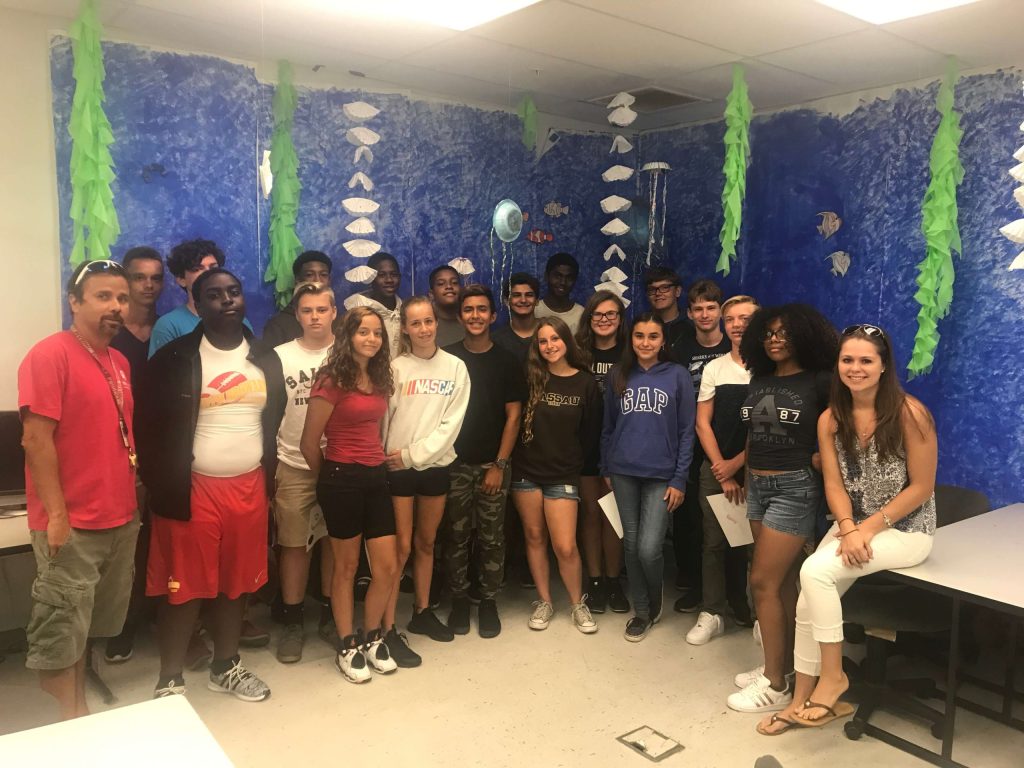
Interns from The Billfish Foundation spent Thursday morning at South Broward High School with a group of incoming freshmen who are part of the marine magnet program. These students have a particular interest in marine education, from boat mechanic training to fish conservation, and sat ready with notebooks to absorb all information. A few were tricked with the first question of what is a billfish–ballyhoo and swordfish were mistakenly identified. But a quick biology lesson cleared up the confusion of distinguishing billfish, and opened the door to conversation about their importance, both in the ecosystem and to the economies
ELECTRONIC MONITORING
As fisheries regulations develop, there is often the need for enforcement of compliance—enforcing gear restrictions, enforcing size limits, enforcing the return of non-target species, and ultimately enforcing the law. Ensuring compliance with such regulations on the high seas, however, is easier said than done. Some vessels can spend months at sea, beyond the jurisdiction of any nation, and even when vessels are within national waters their activities are so distant from land and the law that much can go unnoticed. Observer programs attempt to shrink the room for lawlessness by employing a person to watch the day-to-day operations




